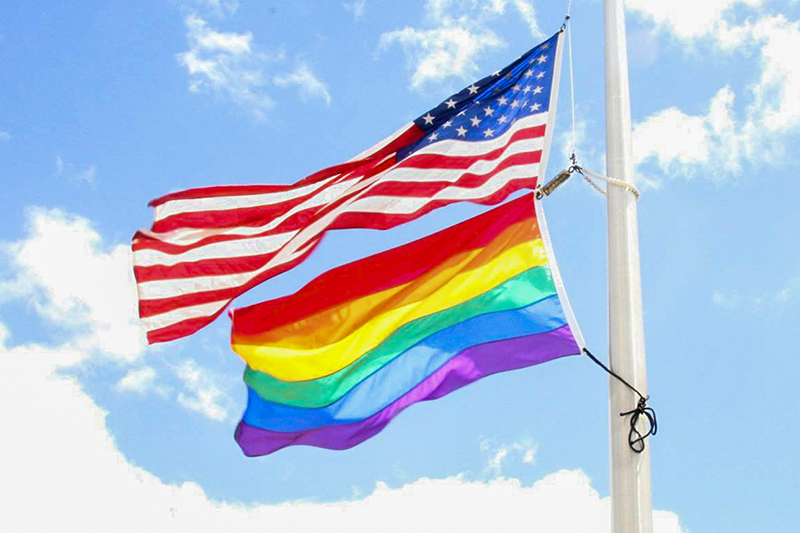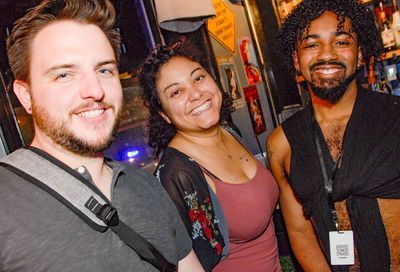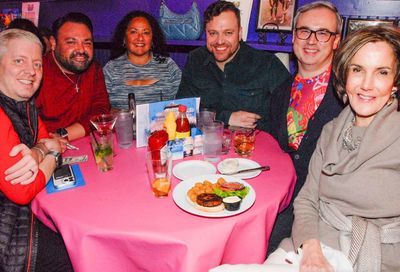LGBT Allies Brace for Discrimination Bills
“Religious Freedom Restoration Acts” would grant the right to refuse service to gays and lesbians

Even with the advent of marriage equality in a majority of U.S. states, LGBT allies remain on high alert as they brace for the introduction of bills that seek to curtail gay-rights gains. How so? By allowing people or businesses to discriminate against LGBT people and married couples in various forms by claiming religious objections. Already, Texas, South Carolina and Michigan have jumped on the pro-discrimination bandwagon, and many expect other Republican-leaning or “swing” states, including Virginia, to be next in line.
The American Civil Liberties Union (ACLU), in a Dec. 11 press briefing, announced the expansion of its Out4Freedom campaign to push for marriage equality, noting that the campaign will be fighting against any bills that seek to deny LGBT people equal rights under the guise of religious freedom.
“In the midst of the progress that we’re seeing on marriage, and that we are seeing in terms of seeking new nondiscrimination laws, we’re also seeing a troubling push to use religion as an excuse to discriminate against LGBT people, and, quite frankly, against others as well,” James Essex, the director of the ACLU Lesbian, Gay, Bisexual and Transgender Project, told reporters.
“It’s no accident that these bills are appearing now,” Esseks added. “The opponents of LGBT equality are moving from their Plan A to Plan B. Plan A very simple: it was to stop us. … And for a while, they were doing pretty well on their Plan A…but their Plan A is not going so well anymore. We are making progress on many fronts on LGBT rights, which is a wonderful thing. So they need a Plan B. And Plan B is using religious freedom arguments in an effort to justify anti-gay discrimination, because they want to make sure LGBT equality doesn’t affect them.”
Currently, 21 states have laws on the books prohibiting discrimination in employment, housing and public accommodations based on sexual orientation, and 18 of those states extend the same protections to transgender individuals. But supporters of LGBT rights say they are alarmed at several provisions in some of the bills, which opponents of LGBT rights have labeled “Religious Freedom Restoration Acts,” or RFRAs. Some RFRA laws allow an individual, such as a county clerk, to refuse to issue a marriage license to same-sex couples or to refuse to recognize a marriage in places where marriage equality is law. Other RFRA laws contain provisions that allow businesses to refuse service to gay or lesbian people.
Furthermore, LGBT allies claim that the RFRAs being proposed are overly broad, and may be interpreted to subvert existing laws, such as those governing child welfare or domestic violence.
According to Esseks, some of the RFRAs could potentially allow a hotel owner to discriminate against a cohabitating straight couple; allow a homeless shelter to turn away a Muslim family; or allow men who beat their wives to claim their religious beliefs require them to discipline their families as they see fit. LGBT allies saw 10 RFRAs introduced in various states during the 2014 legislative session, with nine of those bills eventually being rejected — most prominently, through a gubernatorial veto in Arizona following nationwide protests — and the tenth, in Mississippi, passed only after being significantly narrowed.
“As we push for LGBT nondiscrimination laws in this environment, we’re looking for are laws that treat sexual orientation and gender identity discrimination the same as other forms of discrimination,” Esseks said. “And that means no religious exemptions. Because the country’s existing civil rights laws don’t allow people to discriminate in hiring, based on sex, or turn people away based on race, even where the desire to treat other people differently is based on religion.”
With RFRA laws already introduced or in the process of being drafted in Michigan, Texas, South Carolina, Kansas, Utah and North Carolina, LGBT allies in the DMV area are also on guard against bills that would allow discrimination under the guise of religion. Kirsten Bokenkamp, a spokeswoman for Equality Virginia, said that the organization was closely monitoring the 2015 legislative session for any such bills. On Dec. 9, Equality Virginia, the commonwealth’s major LGBT rights organization, sent a letter to members of the Virginia General Assembly asking them to oppose any bill that would allow any business or service agency to discriminate based on religious or moral beliefs.
“Everyone is entitled to their own religious beliefs, but when you operate a business or run a publicly-funded social service agency that’s open to the public, your religious beliefs do not give you a license to discriminate,” James Parrish, the executive director of Equality Virginia, said in the letter. “It’s that simple.”
Del. Patrick Hope (D-Arlington Co.) told Metro Weekly that it wouldn’t surprise him if Republicans in charge of the General Assembly tried to introduce a RFRA-style law during the 2015 session, though legislative success wasn’t guaranteed. As of print deadline, no such bill had been introduced, although bills may be proposed through Jan. 14. However, Hope also said that any discriminatory measure, if it managed to pass both chambers, would be vetoed by Gov. Terry McAuliffe (D). While there are enough Republicans to override a gubernatorial veto in the House of Delegates, a veto override would fail in the more closely-divided Senate.
“It would be a cold day in hell before Gov. Terry McAuliffe would sign a bill like that,” Hope said.
More importantly, Hope added, in Virginia, 2015 is an election year, which may give even the most fervent social conservatives in the legislature pause before introducing such a volatile measure.
“Because it’s an election year, you sort of want to double-dog-dare people to bring up such a hateful bill like that,” Hope said. “Because it reminds people of how extreme they are.”
Support Metro Weekly’s Journalism
These are challenging times for news organizations. And yet it’s crucial we stay active and provide vital resources and information to both our local readers and the world. So won’t you please take a moment and consider supporting Metro Weekly with a membership? For as little as $5 a month, you can help ensure Metro Weekly magazine and MetroWeekly.com remain free, viable resources as we provide the best, most diverse, culturally-resonant LGBTQ coverage in both the D.C. region and around the world. Memberships come with exclusive perks and discounts, your own personal digital delivery of each week’s magazine (and an archive), access to our Member's Lounge when it launches this fall, and exclusive members-only items like Metro Weekly Membership Mugs and Tote Bags! Check out all our membership levels here and please join us today!


























